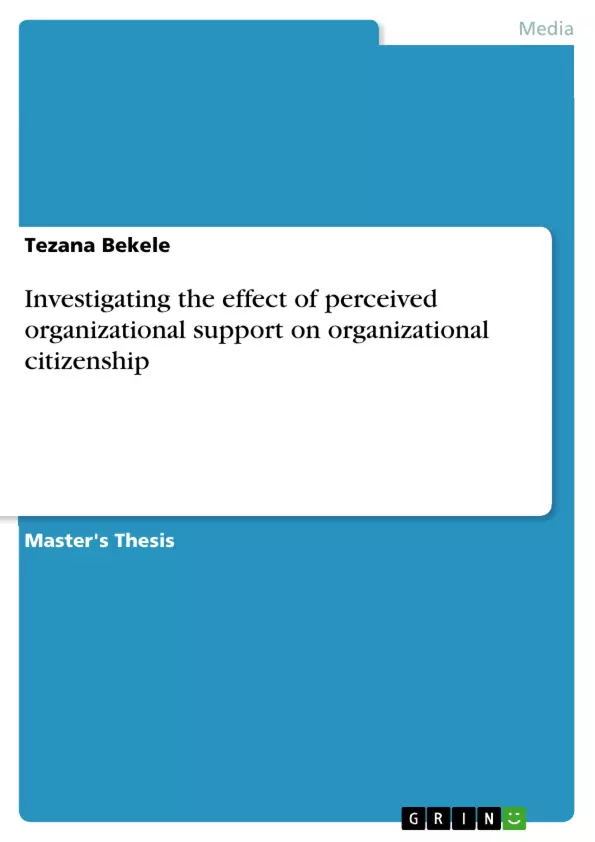This research aims to investigate the effect of perceived organizational support on employee organizational citizenship behavior in the case of academic staffs of Arba Minch University. For the sake of achieving the objectives of this study, the information gathered through questionnaire from 282 respondents were analyzed using statistical analysis. The respondents were selected using stratified sampling followed by a simple random sampling technique. The most important findings of this study is that perceived organizational support has a positive and significant effect on organizational citizenship behavior. Results revealed that there is a significant difference between male and female academic staffs towards exhibiting organizational citizenship behavior and insignificance difference found on dimensions of perceived organizational support. Moreover, there is a significant difference in the perception of supervisory support, procedural justice, career development opportunities, decision-making involvement and exhibition of organizational citizenship behavior based on education level.
The result of the Pearson correlation coefficient analysis showed that perceived organizational support dimensions have a significant and positive relationship with organizational citizenship behavior. The results of multiple linear regression showed that the best predictor of organizational citizenship behavior had been supervisory support. Based on findings, recommendations to Arba Minch university management and suggestions for other researchers are forwarded.
Keywords; perceived organizational support, organizational citizenship behavior
Inhaltsverzeichnis (Table of Contents)
- CHAPTER ONE
- 1. INTRODUCTION
- 1.1 Background of the Study
- 1.2 Statement of the problem
- 1.3 Objective of the Study
- 1.3.1 General Objective
- 1.3.2 Specific Objectives
- 1.4 Scope of the Study
- 1.5 Significance of the Study
- 1.6 Operational Definition of Terms
Zielsetzung und Themenschwerpunkte (Objectives and Key Themes)
This research aims to investigate the effect of perceived organizational support on employee organizational citizenship behaviour within the context of academic staff at Arba Minch University. To achieve this, the study analyzes data collected through questionnaires from 282 respondents, utilizing statistical analysis techniques.
- The relationship between perceived organizational support and organizational citizenship behavior among academic staff.
- The influence of gender on organizational citizenship behavior.
- The effect of perceived organizational support dimensions on organizational citizenship behavior.
- The impact of education level on both perceived organizational support and organizational citizenship behavior.
- Identifying the strongest predictor of organizational citizenship behavior among the dimensions of perceived organizational support.
Zusammenfassung der Kapitel (Chapter Summaries)
Chapter One: Introduction
This chapter provides an overview of the study's background, outlining the problem of organizational citizenship behaviour and the significance of investigating the effect of perceived organizational support. It also sets forth the study's objectives, scope, and operational definitions of key terms.
Schlüsselwörter (Keywords)
Perceived organizational support, organizational citizenship behavior, academic staff, Arba Minch University, statistical analysis, supervisory support, procedural justice, career development opportunities, decision-making involvement, education level.
Frequently Asked Questions
What is Perceived Organizational Support (POS)?
POS refers to employees' perception concerning the extent to which the organization values their contribution and cares about their well-being.
What is Organizational Citizenship Behavior (OCB)?
OCB is a person's voluntary commitment within an organization or network that is not part of their contractual tasks but promotes effective functioning.
What was the main finding of the study at Arba Minch University?
The study found that perceived organizational support has a significant and positive effect on the organizational citizenship behavior of academic staff.
Which factor was the best predictor of OCB in this research?
According to the multiple linear regression results, supervisory support was the strongest predictor of organizational citizenship behavior.
Does gender influence organizational citizenship behavior?
Yes, the research revealed a significant difference between male and female academic staff regarding the exhibition of OCB.
How does education level affect perceptions of support?
The study found significant differences in how staff perceived supervisory support, procedural justice, and career development opportunities based on their education level.
- Citar trabajo
- Tezana Bekele (Autor), 2019, Investigating the effect of perceived organizational support on organizational citizenship, Múnich, GRIN Verlag, https://www.grin.com/document/496481



